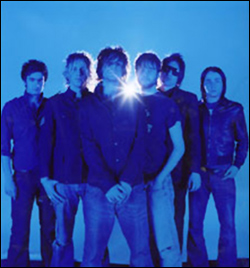You can’t pin Spock’s Beard on Thom Yorke. Even before The Bends and OK Computer, when at last the prog virus seemed safely relegated to those weedy corners of suburbia where success is measured by the length of the family bong and dining room tables tend to be six-pocketed and covered in green felt, the currents of excess that engendered Yes, Genesis, Kansas, and all those other leviathans of rock’s Jurassic era continued to surge through pop music in other ways, sparking a veritable pandemic of skit-infested, hip-hop concept albums and 12-minute dance singles, not to mention the unfortunate and exceedingly time-consuming things that happened nearly every time J. Mascis picked up a guitar. All Radiohead did to get saddled with the prog tag was sound big and add an extra song section from time to time.
Besides, Radiohead and their progeny are a far cry from Spock’s Beard, or even Coheed and Cambria, both mere emissaries of a mildly rejuvenated old prog order. Unlike prog, the new epic rock has no use for mythical kingdoms, multiple-disc magnum opuses, or extended around-the-horn instrumental workouts. Kick Up the Fire and Let the Flames Break Loose (BMG), the Cooper Temple Clause’s newly released second album, doesn’t even have solos. The Coopers rely on mystery, extreme dynamics, and lavish electronics to get their pompometer readings up to contender status—especially the electronics. Were it not for its luxuriantly administered synths, Kick Up the Fire would be little more than a well-considered Oasis/Kyuss hybrid, especially given singer Ben Gautrey’s propensity for getting sleazy whenever opportunity knocks, as on “A.I.M.” Gautrey tiptoes through the down tempo trembler’s verse as limpidly as any proper Britpop lad, with only a sinister synth bass and spare drums for accompaniment; it’s only when the chorus’ guitars drop like safes from a 12th-floor window that he moans, “She’s all I need/She’s wired into me/Hey, don’t you think I know it’s unhealthy,” like he’s the Big Bad Wolf checking in with his probation officer in the middle of a bender.
Kick Up the Fire would have benefitted greatly from a few more injections of Gautrey’s wickedness—and a lot more rock. The album is most compelling when the Coopers assume the Jesus Christ pose of “Promises, Promises,” a monolithically riff-heavy betrayal song that finds Gautrey tormentedly telling an ex-bamboozler to “Just keep your mouth shut/You got no mind to blow/You celebrate things, you celebrate things/Forget about me and just desecrate everything” over a torrent of massed guitars. But when they’re nice, which is much of the time, the Coopers tend to sound even more watery than Stone Roses. They could use a little more dedicated testosterone, too, especially on “Written Apology.” The track’s panoramic electro-tempest finale makes like the preamble to Armageddon itself, then fizzles mysteriously at the one spot on the album where a nicely overblown guitar solo would have driven the whole adventure straight to paradise.
But the Coopers support Muse in this review, the same role they played when the bands toured together in 2001. There’s no shortage of guitars, rock, wickedness, or Armageddon on Muse’s Absolution (Warner Bros.), thanks to leader Matt Bellamy’s magnificent megalomania. Less than one minute into the album’s first proper song, “Apocalypse Please,” the mad prophet of Teignmouth belts, “This is the end/This is the end/Of the world,” in no less than eight measures and 20 notes—not counting overtones, glissandi, or the angelic choir that slides under the chorus’ last word. Hell, Muse don’t even wait that long to start thinking big; the track begins with a piano-bound Bellamy, bassist Chris Wolstenhome, and drummer Dominic Howard pounding relentlessly as Mad Matt commands, “Declare this an emergency/C’mon and spread a sense of urgency/And put us through,” with nearly as much Sturm und Drang as World War II and considerably more coloratura—nine notes on “through” alone.
The early-’90s spirit that informed the band’s early efforts is still whiffable on Absolution (Muse formed in Devon in 1992). “Time Is Running Out” (see a pattern yet?) features abrupt dynamics and a corroded guitar attack—but compared to their first two albums, it’s a mere ghostly wisp. Muse plunder pretty much any decade they please with alacrity. Wolstenhome exploits Kim Gordon’s old split clean/dirty signal trick like he invented it, while Howard works the tom-toms like Budgie’s legitimate heir (the Siouxsie drummer, not the ’70s burnout band). Bellamy, who’s also a strikingly original guitarist, snatches whatever strikes his fancy—a Freddy Mercury gesture here, a piece of Bono’s soapbox there—and puts it all wherever he damn well pleases.
He even drags poor Rachmaninoff onto the album’s most moving track, “Butterflies and Hurricanes.” The song, an inspirational number about—surprise!—the end of the world as we know it, starts normally enough, all rich chromatics with sinister little details and Bellamy cooing, “Change/Everything you are/And everything you were/Your number has been called.” After a couple of heroically swelling verse/chorus combos, the volume drops and a portentous string ensemble signals end-time—or so it seems. Suddenly, Bellamy’s piano and the newly voluptuous strings erupt into the kind of sweeping, late-romantic interlude that conjures images of tailcoats, crystal chandeliers, desperate love, and lightning.
There’s absolutely no way the goddamn thing could possibly fit, but Bellamy wedges it in with so much irony-free self-assurance that he offers no option but surrender, especially as he actually finds his way back into the song proper and gets more grand. Despite their admitted debt to Freddie Mercury and company, Muse make Queen seem like Ween in the majesty department. Even the purest, most convoluted and technically adept prog bombast pales before Muse’s—despite the fact that Absolution‘s longest song clocks in at five minutes and one second. No artist since Prince has taken himself as seriously as Bellamy, nor strived as hard to justify that seriousness—not even Thom Yorke, who seems a bit quaint next to his more intrepid, less thoroughly hinged colleague.
Cooper Temple Clause play Crocodile Cafe with Calla at 8:30 p.m. Sun., March 28. $9 adv./$10. They also play an in-store that day at the Queen Anne Easy Street Records at 2 p.m. 20 Mercer St., 206-691-3279. Free.








